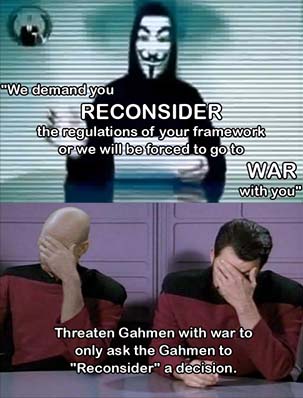- Joined
- Jul 24, 2008
- Messages
- 33,627
- Points
- 0
http://yawningbread.wordpress.com/2013/11/02/hacker-strikes-fear-among-good-citizens/
Hacker strikes fear among “good” citizens <small class="entry-meta"> Published <abbr class="published" title="2013-11-02T16:26:41+0000">2 November 2013</abbr> media , politics and government , society and culture56 Comments
</small> <!-- .entry-meta --> <!-- .entry-head -->

Maybe the Stompers best represent our beating heart. There was a passing mention in a Facebook post that 87% were happy with the hacking of Straits Times’ blog website. Schadenfreude is a totally legitimate emotion.
“Stompers” is the name we give to mostly anonymous readers and contributors to the Straits Times wild wild west site Stomp where digital natives can post anything they think newsworthy — mostly pictures and videos of bad behaviour, overflowing drains and women with cleavages.

[Addendum, 3 Nov 2013] Thanks to reader Paul Ananth Tambyah, here is the link to the Stomp article. At left is a screen capture of it taken on 3 Nov 2013, Sunday, at 01:30h. If you scroll down to the bottom of the article, there is a “mood meter” which I assume is dynamic, and at the date/time of screen capture, 85% felt “shiok”(colloquial term for thrilled, happy) with another 3% who felt it was “cute”.[End addendum]
There were a few bloggers who were quick to address the issue, though what may be more remark-worthy is how rapidly the excitement of the incident dissipated. After a brief flurry of news reports and online sharing, it’s largely gone from at least my end of social media. In that brief burst of chatter, however, the thing that caught my eye was how many bloggers and social media participants took pains to distance themselves from the hacking: We don’t approve of such tactics, they kind-of say.
Then what are you saying? That even if you are victimised by a brutish government, you should go no further than respectful and polite conversation?
Is that fear speaking?
Get a grip. Hacking is not sui generis. It is one among a vast continuum of acts of resistance. At one extreme end, there are suicide bombers or roadside explosive devices. Occasionally, we hear of self-immolation. But everyday, there are, around the world, protests, demonstrations and strikes. Angry farmers blockade country highways or dump rotting pig carcasses in front of agriculture ministries. Anti-pollution residents occupy and shut down the factory in their neighbourhood that poisons their groundwater. Workers hearing of their pension fund being raided to pay company debts go on strike.
Perhaps every minute of every day, somebody somewhere is spray-painting politically-inspired graffiti.
 Turkish Airlines staff in a protest to safeguard their labour rights, June 2013
Turkish Airlines staff in a protest to safeguard their labour rights, June 2013
All these acts cause disruption or impose costs, either on the public or on private property. If you’re going to take the position that once an act of resistance causes disruption or imposes costs, then it is illegitimate (and we can’t possibly “approve” of that), you are basically ruling out all acts of resistance and condemning humankind to perpetual subjugation. You will in effect be saying that preserving your in-group comfort and convenience is more important than a victimised, dispossessed or neglected group’s cry for attention and redress.
That said, some tactics cause a lot more collateral damage than others. Terrorist bombings or bus hijacks have a tendency to kill and maim innocent people, for example. If we have to draw a line somewhere, it should be on the basis of how well-targeted that choice of tactic is. Causing some inconvenience is one thing; injuring innocent bystanders is quite another. Nearly all people will say bombings and taking hostages are just not on. But by this measure, the hacking of the Straits Times blogsite is pretty well targetted and not more than the tiniest of gestures. How much inconvenience, let alone injury, has it caused innocent persons?
If we are so queasy about even that, quick to distance ourselves from what is a pretty mild act of resistance, then we’re a hopeless lot.
* * * * *
 Millions of protesters demonstrated across Brazil in June 2013 over poor transport and social services. This pic is of a demonstration in Belem.
Millions of protesters demonstrated across Brazil in June 2013 over poor transport and social services. This pic is of a demonstration in Belem.
As an aside, why are we so quick to register our approval or non-approval of this hacking? I wonder if the anxious need to register our stand is itself another indicator of the fear that has deformed us. We don’t go around taking clear stances on demonstrations, strikes, even the occasional riot. We may understand some causes better than others, but generally we respect the fact that on certain issues, some people are more affected than others. We recognise that there are times when people get really angry and feel they have few other ways to express themselves with effect. Their taking such action (protests, strikes, etc) is not something that we must instantly pass judgement on.
So why are we doing so in this case?
* * * * *
 Brazilians in Sao Jose dos Campos, protesting poor public services, police violence and government. Photo: Roosevelt Cassio/Reuters
Brazilians in Sao Jose dos Campos, protesting poor public services, police violence and government. Photo: Roosevelt Cassio/Reuters
There is some speculation that the hacker is Singaporean. People have noted the way the video threat, posted onto Youtube (now since taken down) on either 30 or 31 October 2013, was unusually specific about something our government did — imposing new regulations on news websites earlier this year. There were also slightly derogatory comments about language quality. The video message opened thus:
In this day and age, resistance networks, e.g. Al Qaeda or Wikileaks, draw adherents and partners (or more accurately, combatants in Al Qaeda’s case) from any number of countries. More crucially, they don’t have defined boundaries; countless smaller, independent or semi-independent groups or individuals are affiliated at the margins.

Curiosity about whether the hacker in this case is Singaporean is understandable, but I think we should be careful not to let his nationality colour our assessment of the depth of his grievance and the seriousness of his mission.
In the same vein, there were belittling comments about how the bombast of the threat was out of all proportion to the demand; see image at left which I think originated from Fabrications About The PAP — the ruling party’s corps of internet “warriors”.
We should see the above reactions for what they are — attempts to:
These are attempts to make it easier for others to disassociate themselves from what he’s done, and by extension disassociate themselves from his aims — the dismantling of censorship.
But wait a minute — isn’t the dismantling of censorship what we want?
Hacker strikes fear among “good” citizens <small class="entry-meta"> Published <abbr class="published" title="2013-11-02T16:26:41+0000">2 November 2013</abbr> media , politics and government , society and culture56 Comments
</small> <!-- .entry-meta --> <!-- .entry-head -->

Maybe the Stompers best represent our beating heart. There was a passing mention in a Facebook post that 87% were happy with the hacking of Straits Times’ blog website. Schadenfreude is a totally legitimate emotion.
“Stompers” is the name we give to mostly anonymous readers and contributors to the Straits Times wild wild west site Stomp where digital natives can post anything they think newsworthy — mostly pictures and videos of bad behaviour, overflowing drains and women with cleavages.

[Addendum, 3 Nov 2013] Thanks to reader Paul Ananth Tambyah, here is the link to the Stomp article. At left is a screen capture of it taken on 3 Nov 2013, Sunday, at 01:30h. If you scroll down to the bottom of the article, there is a “mood meter” which I assume is dynamic, and at the date/time of screen capture, 85% felt “shiok”(colloquial term for thrilled, happy) with another 3% who felt it was “cute”.[End addendum]
There were a few bloggers who were quick to address the issue, though what may be more remark-worthy is how rapidly the excitement of the incident dissipated. After a brief flurry of news reports and online sharing, it’s largely gone from at least my end of social media. In that brief burst of chatter, however, the thing that caught my eye was how many bloggers and social media participants took pains to distance themselves from the hacking: We don’t approve of such tactics, they kind-of say.
Then what are you saying? That even if you are victimised by a brutish government, you should go no further than respectful and polite conversation?
Is that fear speaking?
Get a grip. Hacking is not sui generis. It is one among a vast continuum of acts of resistance. At one extreme end, there are suicide bombers or roadside explosive devices. Occasionally, we hear of self-immolation. But everyday, there are, around the world, protests, demonstrations and strikes. Angry farmers blockade country highways or dump rotting pig carcasses in front of agriculture ministries. Anti-pollution residents occupy and shut down the factory in their neighbourhood that poisons their groundwater. Workers hearing of their pension fund being raided to pay company debts go on strike.
Perhaps every minute of every day, somebody somewhere is spray-painting politically-inspired graffiti.

All these acts cause disruption or impose costs, either on the public or on private property. If you’re going to take the position that once an act of resistance causes disruption or imposes costs, then it is illegitimate (and we can’t possibly “approve” of that), you are basically ruling out all acts of resistance and condemning humankind to perpetual subjugation. You will in effect be saying that preserving your in-group comfort and convenience is more important than a victimised, dispossessed or neglected group’s cry for attention and redress.
That said, some tactics cause a lot more collateral damage than others. Terrorist bombings or bus hijacks have a tendency to kill and maim innocent people, for example. If we have to draw a line somewhere, it should be on the basis of how well-targeted that choice of tactic is. Causing some inconvenience is one thing; injuring innocent bystanders is quite another. Nearly all people will say bombings and taking hostages are just not on. But by this measure, the hacking of the Straits Times blogsite is pretty well targetted and not more than the tiniest of gestures. How much inconvenience, let alone injury, has it caused innocent persons?
If we are so queasy about even that, quick to distance ourselves from what is a pretty mild act of resistance, then we’re a hopeless lot.
* * * * *

As an aside, why are we so quick to register our approval or non-approval of this hacking? I wonder if the anxious need to register our stand is itself another indicator of the fear that has deformed us. We don’t go around taking clear stances on demonstrations, strikes, even the occasional riot. We may understand some causes better than others, but generally we respect the fact that on certain issues, some people are more affected than others. We recognise that there are times when people get really angry and feel they have few other ways to express themselves with effect. Their taking such action (protests, strikes, etc) is not something that we must instantly pass judgement on.
So why are we doing so in this case?
* * * * *

There is some speculation that the hacker is Singaporean. People have noted the way the video threat, posted onto Youtube (now since taken down) on either 30 or 31 October 2013, was unusually specific about something our government did — imposing new regulations on news websites earlier this year. There were also slightly derogatory comments about language quality. The video message opened thus:
Greetings Government of Singapore,
We are Anonymous and we believe that we have your undivided attention.
We also believe that you have had the pleasure of meeting our comrade The Messiah, who demonstrated what a single Anon could do to your so call technologically advanced island.
Now allow us to explain the objective of our recent invasions.
The secondary objective was to welcome you to the new rule where ignoring the issues of your citizens will not go ignored by Anonymous. We advise you to stop feigning ignorance and serve the people.
Any form of arrogant and ignorant statement from a person of position towards the people will not go ignored by Anonymous.
Have you forgotten who you work for? Traditionally the workers respect the boss. Let us stick to tradition.
But the primary objective of our invasion was to protest the implementation of the internet licensing framework by giving you a sneak peak of the state of your cyberspace if the ridiculous, communistic, oppressive and offensive framework gets implemented.
I thought it interesting that the question of whether he was Singaporean seemed as important as it did. So what if he’s Singaporean? Are we starting from the presumption that the group Anonymous can’t possibly comprise one or more Singaporeans? Is there subtle racial profiling at work? And that if the person behind this attack was Singaporean, he must be some kind of imposter?We are Anonymous and we believe that we have your undivided attention.
We also believe that you have had the pleasure of meeting our comrade The Messiah, who demonstrated what a single Anon could do to your so call technologically advanced island.
Now allow us to explain the objective of our recent invasions.
The secondary objective was to welcome you to the new rule where ignoring the issues of your citizens will not go ignored by Anonymous. We advise you to stop feigning ignorance and serve the people.
Any form of arrogant and ignorant statement from a person of position towards the people will not go ignored by Anonymous.
Have you forgotten who you work for? Traditionally the workers respect the boss. Let us stick to tradition.
But the primary objective of our invasion was to protest the implementation of the internet licensing framework by giving you a sneak peak of the state of your cyberspace if the ridiculous, communistic, oppressive and offensive framework gets implemented.
In this day and age, resistance networks, e.g. Al Qaeda or Wikileaks, draw adherents and partners (or more accurately, combatants in Al Qaeda’s case) from any number of countries. More crucially, they don’t have defined boundaries; countless smaller, independent or semi-independent groups or individuals are affiliated at the margins.

Curiosity about whether the hacker in this case is Singaporean is understandable, but I think we should be careful not to let his nationality colour our assessment of the depth of his grievance and the seriousness of his mission.
In the same vein, there were belittling comments about how the bombast of the threat was out of all proportion to the demand; see image at left which I think originated from Fabrications About The PAP — the ruling party’s corps of internet “warriors”.
We should see the above reactions for what they are — attempts to:
- cast the hacker as not the genuine article (because he might be Singaporean);
- paint him as a sort of dimwit.
These are attempts to make it easier for others to disassociate themselves from what he’s done, and by extension disassociate themselves from his aims — the dismantling of censorship.
But wait a minute — isn’t the dismantling of censorship what we want?







